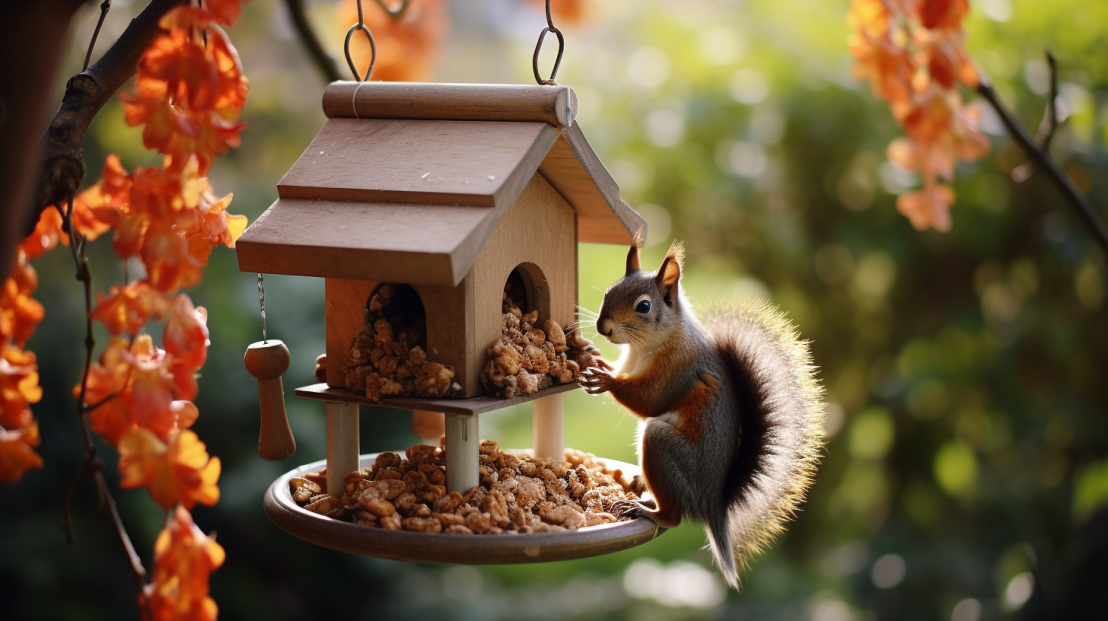Birds and squirrels are two of the most common species that we often come across in our daily lives. While birds are known for their beautiful songs and vibrant plumage, squirrels are notorious for their acrobatic skills and scavenging habits. But have you ever wondered if these two creatures intersect in terms of their diet? In this blog post, we will explore the intriguing question: do squirrels eat birds?
To understand whether squirrels eat birds, we must first examine the typical diet of these furry creatures. Squirrels are classified as omnivores, which means they consume both plant-based and animal-based food items. Their diet primarily consists of nuts, seeds, fruits, berries, insects, and small animals.
- Nuts and Seeds:
Squirrels have a particular affinity for nuts and seeds. They are skilled climbers and are known to collect and hoard nuts for storage. Acorns, walnuts, hazelnuts, and various tree seeds are a significant part of their diet. These food items provide squirrels with essential fats and proteins necessary for their survival. - Fruits and Berries:
In addition to nuts and seeds, squirrels also enjoy feasting on various fruits and berries. They play a vital role in seed dispersal for many plant species. Apples, berries, grapes, and even tree buds are often on the menu for squirrels during their foraging expeditions. - Insects and Small Animals in Diet:
While nuts, seeds, fruits, and berries form the base of a squirrel’s diet, they occasionally supplement it with insects and small animals. It is important to note that this primarily occurs during times when their primary food sources are scarce. Insects, bird eggs, and nestlings could serve as a valuable source of protein for squirrels in such situations.
Now that we have a better understanding of a squirrel’s diet, let’s explore the relationship between squirrels and birds. While birds and squirrels can coexist harmoniously in our backyards and parks, there are certain factors that can lead to conflicts between them.
- Bird Feeders and Squirrels:
One common scenario where squirrels and birds may come into contact is around bird feeders. Squirrels are notorious for their ability to raid bird feeders, often consuming the seeds meant for birds. This behavior can lead to frustration among bird enthusiasts. As a result, different strategies have been developed to deter squirrels from accessing bird feeders, such as using squirrel-proof feeders or placing feeders in squirrel-inaccessible locations. - Predatory Behavior of Squirrels:
While squirrels are primarily herbivores, there have been occasional reports of them engaging in predatory behavior towards birds. However, such instances seem to be rare and are not a common part of their feeding habits. It is believed that squirrels resort to such behavior only when their usual food sources are limited or when they face extreme hunger.
Scientific research has played a significant role in understanding the dietary habits of squirrels and shedding light on their interaction with birds.
- Studies on Squirrel Diet Preferences:
Several researchers have conducted studies to observe squirrel diet preferences in controlled environments. These studies involve offering squirrels a variety of food items, including nuts, seeds, fruits, insects, and even small animals. Through careful observation and analysis, researchers have found that squirrels tend to favor plant-based food over animal-based food. - Observations in Natural Environments:
Observations in natural environments have also yielded interesting insights into the relationship between squirrels and birds. Researchers have observed squirrels foraging alongside birds and have found no evidence of predatory behavior towards birds. This suggests that, in most cases, squirrels and birds can coexist peacefully, sharing the same habitats and food sources. - Examination of Squirrel Droppings:
Another method employed by researchers to determine a squirrel’s diet is the examination of their droppings. By studying the contents of the droppings, researchers can identify what squirrels have been consuming. Analyses have consistently shown that the majority of squirrel droppings contain plant-based materials, providing further evidence of their herbivorous nature.
When it comes to understanding the relationship between squirrels and birds, visual evidence can be compelling. As shown in the suggested images above, squirrels and birds can often be found peacefully coexisting in various situations. These images not only demonstrate the compatibility of these two species but also highlight the importance of providing suitable habitats and food sources for wildlife.
To summarize, while occasional instances of predatory behavior by squirrels towards birds may occur, the typical diet of squirrels consists of nuts, seeds, fruits, and berries. Scientific studies, natural observations, and the analyses of squirrel droppings consistently support the notion that squirrels do not typically eat birds as a part of their regular diet. Understanding the natural behaviors and dietary preferences of squirrels and birds can help us create environments where both species can thrive harmoniously.Birds and squirrels are fascinating creatures that captivate our attention in different ways. While birds are known for their colorful plumage and melodious songs, squirrels are admired for their acrobatic abilities and curious behavior. It is not uncommon to see these two species sharing the same habitat, and this leads to the question: do squirrels eat birds?
Exploring the Diet of Squirrels
To answer this question, we need to delve deeper into the dietary preferences of squirrels. Squirrels are primarily herbivores, but they do have some opportunistic omnivorous tendencies. Let’s take a closer look at their diet:
1. Plant-Based Diet
Squirrels primarily feed on nuts, seeds, fruits, and berries. Their sharp incisor teeth allow them to crack open nuts, such as acorns and walnuts, to extract the nutrient-rich kernels. Squirrels are excellent foragers and gatherers, often storing excess food for the winter months when their preferred food sources become scarce. They also enjoy munching on various fruits and berries, which provide them with essential vitamins and antioxidants.
2. Insects and Invertebrates
While plant-based foods make up the bulk of a squirrel’s diet, they do occasionally consume insects and other small invertebrates. This behavior is more common in younger squirrels who are still developing their dietary preferences. Insects and invertebrates serve as a valuable source of protein and other vital nutrients.
3. Animal Protein
While squirrels are not classified as true carnivores, there have been occasional reports of squirrels exhibiting predatory behavior towards small birds, such as nestlings. However, such instances are rare and not a regular part of their diet.
It is important to note that the occasional consumption of birds by squirrels is driven by specific circumstances, such as food scarcity or extreme hunger. Overwhelming evidence indicates that squirrels do not typically eat birds as a significant part of their diet.
The Coexistence of Squirrels and Birds
Squirrels and birds often share the same habitat, such as urban parks or wooded areas, and generally coexist harmoniously. Here’s a closer look at how these two species interact:
1. Nesting and Nest Predation
Birds build their nests in trees and other elevated structures to protect their eggs and nestlings from potential predators. While squirrels may come into close proximity to bird nests, they are not significant nest predators. Squirrels usually build their own nests, called dreys, in tree branches, and they do not pose a significant threat to bird nests or their occupants.
2. Bird Feeders and Squirrels
Squirrel visits to bird feeders can sometimes lead to conflicts between birds and squirrels. Squirrels are known for their agility and ability to overcome various obstacles to access bird feeders. This behavior may result in a decrease in the food available to birds. To mitigate this issue, squirrel-proof bird feeders or alternate feeding sites can be employed to ensure that both birds and squirrels can access food without competition.
3. Mutualistic Relationships
While there are occasional instances of conflict, squirrels and birds also engage in mutualistic relationships. For instance, squirrels play a crucial role in seed dispersal for many plant species. They bury nuts and seeds in various locations for future consumption, often forgetting where they buried them. This natural process helps with the dispersal and propagation of plants.
4. The Presence of Predatory Birds
One factor that may deter squirrels from preying on birds is the presence of predatory birds in the area. Birds of prey, such as hawks and owls, pose a significant threat to squirrels. This natural predation pressure may influence the behavior and feeding preferences of squirrels, keeping them from targeting birds.
Conclusion
When it comes to the question “do squirrels eat birds?”, the answer is not straightforward. While squirrels are primarily herbivores, they may occasionally consume insects, small invertebrates, and even birds in certain circumstances. However, these instances are relatively rare, and the evidence overwhelmingly suggests that squirrels do not typically eat birds as a significant part of their diet.
The coexistence between squirrels and birds is generally peaceful, with both species sharing the same habitats and resources. By providing adequate food sources and implementing strategies to reduce conflicts, such as using squirrel-proof bird feeders, we can ensure the harmonious cohabitation of these fascinating creatures.
So, the next time you see a squirrel and a bird together, enjoy the beauty of this unique interaction and appreciate the intricacies of nature’s tapestry.
Hey there, fellow nature enthusiasts! I’m Mark Gray, the passionate owner of OutdoorAnimals.com, a hub dedicated to uncovering the incredible world of outdoor animals. Whether you’re a hiker, a four-wheeler, or just someone who revels in the beauty of the great outdoors, you’re in the right place. I seek to understand all varieties of animals, from the great elk to the simple mouse, my goal is to write and share this knowledge with the public.


1 thought on “Do Squirrels Eat Birds? Exploring the Diet and Relationship”
Comments are closed.